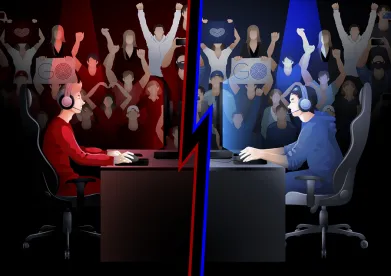The business of sports poses a dilemma for antitrust law. On the one hand, antitrust discourages, and in some cases outlaws, cooperation among separate and competing business, such as professional sports teams. On the other hand, cooperation is essential to organizing and operating a sports league. It is not always easy, therefore, to recognize the demarcation between allowable coordination that is essential to producing the sport and unlawful collusion between what ought to be separate, competing entities.
The same dilemma arises in esports, which this year will generate about $1.5 billion in revenues. While esports currently represents a much smaller quantum of commerce than traditional stick-and-ball sports, total esports revenues are expected to grow at a rate of about 25% per year. With that kind of growth, esports is poised to become a significant slice of the entertainment pie. As the sector expands and market participants gather economic power, antitrust principles will inevitably come to play an important role in the business of esports, just as they do in the wider realm of the traditional sports business.
Traditionally, game publishers had viewed esports leagues and gaming competitions as a way of marketing a particular game title and as a “necessary evil,” according to Sean F. Kane, co-Chair of the Interactive Entertainment Group at Frankfurt Kurnit Klein & Selz in New York and co-author of the book, Video Game Law: Everything You Need to Know About Legal and Business Issues in the Game Industry. He notes that some publishers of video games that were not initially designed for third-party viewing may have permitted fan tournaments but did not seek to monetize exhibition through leagues or tournaments.
Today, however, even though most esports leagues are in the “germination stage,” many titles are created and marketed with competitive exhibitions in mind. Video game publishers rely on any number of business approaches, including offers of prize money, monetizing player and influencer streams on platforms such as Twitch, YouTube, or Mixer, establishing franchise leagues and minimum player salaries, entering into sponsorship deals for brands or hardware, or sponsoring one-off promotional events.
While all of this is reminiscent of traditional sports, esports is a “different animal,” says Bill Gantz, a partner at Dentons in Boston. “The game publishers own the intellectual property rights to the entire game.” They have the “full panoply of IP rights and, with that, the right to control how the game is used,” he says. In this light, there may be limited scope for antitrust until the law and lawsuits have a chance to evolve, he says. In the meantime, “the IP law is clear.”
While Dennis M.P. Ehling, partner at Blank Rome in Los Angeles, agrees that publishers are entitled to control the use of game titles for commercial purposes, at some point, he notes, once a publisher has created an “entire economy based around a particular game, it’s difficult to see how traditional antitrust will not apply.” When that point is reached, the question will be whether the game publisher has gone beyond the lawful scope of its intellectual property protection to limit competition in a way that injures market participants or fans.
Ehling notes that the sports world does not have a lot of experience with the formation of new leagues around brand new games and, to the extent they do, they have in mind the existing leagues for existing sports. At some level, therefore, the organization of traditional sports will be the model that most parties outside the video game industry will tend to gravitate toward for questions related to third-party venues seeking to host eSports tournaments, betting on games, and streaming rights.
Benjamin R. Mulcahy, partner at DLA Piper in Los Angeles, notes that as esports leagues start to structure themselves more like traditional stick and ball sports leagues, they will inevitably raise the same antitrust issues that professional sports leagues have faced. These include restraints on player trades and free-agency and salary caps, all of which could create a role for a players’ union to facilitate an agreement on these topics through collective bargaining.
Currently, the league structures created by most publishers are generally pro-competitive, for example, establishing minimum player compensation levels. Where antitrust principles are likely to come into play is in mature leagues where, for example, a particular team wants to relocate over the objection of the league, or the league wants to maintain competitive balance by imposing league-wide restraints on players. Mulcahy also notes that some teams seek to treat players as independent contractors and impose post-term covenants not-to-compete.
Generally, however, Mulcahy notes that classifying players as independent contractors will be difficult to defend in some jurisdictions like California, and in those same jurisdictions, covenants not-to-compete in player agreements will be difficult to enforce unless they relate to players who have an equity stake in the team or had access to trade secrets.
As is often the case, the antitrust analysis can depend on market definition. As Kane notes, different game titles require different skills. Fortnite and Overwatch are different than League of Legends or Dota 2. From a gamer’s perspective, the relevant market is likely to be a single title or single game-play genre. This is likely to limit the enforceability of non-compete provisions in gamer agreements that transcend individual game titles or genres.
Gantz notes that the enforceability of covenants not-to-compete is a matter of state law. Nonetheless, a covenant not-to-compete may be appropriate and enforceable where a gamer has a recognized “personality” associated with a particular game or publisher. Esports differs in this regard from traditional sports, in which player value is based on a comparatively limited set of skills needed to achieve competitive success. In esports, however, gamers who do not excel at competitive play may nonetheless create value and a fan base as a personality, as the inventor of recognizable moves or gaming strategies, or because they are influencers with a substantial following.
Because of this, there is no one answer to whether non-compete restraints on esports gamers are enforceable or anti-competitive. Ehling draws an analogy with commercial spokesmen that become associated with a particular brand. Agreements to employ commercial actors that contain non-compete provisions with a “tail,” i.e., a provision prohibiting the actor from working for a competing brand for a reasonable period of time after employment, are enforceable. Thus, where a gamer’s personality or image becomes affiliated with a particular title or publisher, post-employment restraints prohibiting the gamer from playing in a closely related game or genre for a reasonable period of time may be enforceable.
Restraints in gamer agreements solely intended to prevent the gamer from competing in a different game or genre or for a different team in the same game, however, may be less likely to withstand scrutiny. Compared to traditional sports, the player rosters in esports are significantly smaller, increasing the value of individual gamers. The need for teams to retain their best players and to prevent them from being poached by competing teams has been a factor motivating teams to seek restraints on player mobility. Where the principal purpose of such provisions is to restrain player movement, however, they are not likely to be enforceable.
Similarly, non-compete provisions in gamer agreements between “gamer collectives” and the gamers they engage are not likely to be legally enforceable. In the litigation between Turner Tenney, who goes by the name Tfue, against esports organization FaZe Clan, for example, Tenney is challenging a non-compete provision in his contract with FaZe as overbroad and unenforceable because it limits him to deals sourced exclusively by FaZe, thereby preventing him from exploring deals presented by others. Not surprisingly, most leagues take a “soft-touch” approach to gamer relationships, says Mulcahy, leaving player relationships to be sorted out by the individual teams.
While there is little consensus over the kind of competition dispute that is likely to emerge as particularly important for esports, there is a broad understanding among esports experts that antitrust law will begin to play an important role in the not-so-distant future.
Part Two of this article will take a closer look at additional competition and other legal issues affecting esports.
Editor’s Note: This article originally appeared in Sports Litigation Alert, Vol. 16, Iss. 17 & Sports Law Expert




 />i
/>i

